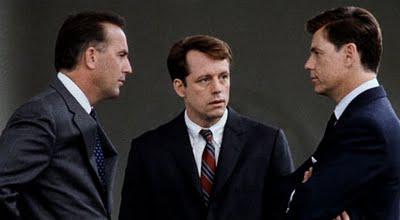 In the fall of 1962, a spy plane took pictures of Russian missiles being assembled in Cuba. This led to a nearly two week conflict in which the United States and Soviet Union played a game of cat and mouse and nearly engaged in all out nuclear conflict. In the end cooler heads prevailed and the Cuban Missile Crisis would go down as the cornerstone of the Kennedy presidency. However, that this film decides to open with shots of nuclear weapons detonating resulting in what appears to be the apocalypse only serves as a reminder of how close we came to the end. The film follows the key players focusing primarily on JFK, Bobby Kennedy, and their close friend and presidential advisor Kenny O'Donnell. Events in the film are often seen through O'Donnell's eyes who acts as the go between among the Kennedys and the other members of the cabinet who often did not see eye to eye on how to handle the situation. Directed by Roger Donaldson, Thirteen Days seems like an honest reenactment of a historical event that will be informative to many people who are either too young to remember or uninformed of the events. I liked the casting in the film. Lesser known actors are used to portray familiar figures (Steven Culp and Dylan Baker and dead ringers for Robert McNamara and RFK respectively) but for the casting of Jack, Bruce Greenwood resembles him but elects not to impersonate his voice and simply act out the part. The result is a very convincing portrayal. I also think that Kevin Costner's role as O'Donnell is crucial, creating an everyman role the audience can identify with. I found myself to be somewhat removed from the material, although there are several fine speeches and intense moments. However, the payoffs during the standoff and other vivid moments are rewarding and it is nice to see such a painstaking historical recreation.
In the fall of 1962, a spy plane took pictures of Russian missiles being assembled in Cuba. This led to a nearly two week conflict in which the United States and Soviet Union played a game of cat and mouse and nearly engaged in all out nuclear conflict. In the end cooler heads prevailed and the Cuban Missile Crisis would go down as the cornerstone of the Kennedy presidency. However, that this film decides to open with shots of nuclear weapons detonating resulting in what appears to be the apocalypse only serves as a reminder of how close we came to the end. The film follows the key players focusing primarily on JFK, Bobby Kennedy, and their close friend and presidential advisor Kenny O'Donnell. Events in the film are often seen through O'Donnell's eyes who acts as the go between among the Kennedys and the other members of the cabinet who often did not see eye to eye on how to handle the situation. Directed by Roger Donaldson, Thirteen Days seems like an honest reenactment of a historical event that will be informative to many people who are either too young to remember or uninformed of the events. I liked the casting in the film. Lesser known actors are used to portray familiar figures (Steven Culp and Dylan Baker and dead ringers for Robert McNamara and RFK respectively) but for the casting of Jack, Bruce Greenwood resembles him but elects not to impersonate his voice and simply act out the part. The result is a very convincing portrayal. I also think that Kevin Costner's role as O'Donnell is crucial, creating an everyman role the audience can identify with. I found myself to be somewhat removed from the material, although there are several fine speeches and intense moments. However, the payoffs during the standoff and other vivid moments are rewarding and it is nice to see such a painstaking historical recreation.
Entertainment Magazine
 In the fall of 1962, a spy plane took pictures of Russian missiles being assembled in Cuba. This led to a nearly two week conflict in which the United States and Soviet Union played a game of cat and mouse and nearly engaged in all out nuclear conflict. In the end cooler heads prevailed and the Cuban Missile Crisis would go down as the cornerstone of the Kennedy presidency. However, that this film decides to open with shots of nuclear weapons detonating resulting in what appears to be the apocalypse only serves as a reminder of how close we came to the end. The film follows the key players focusing primarily on JFK, Bobby Kennedy, and their close friend and presidential advisor Kenny O'Donnell. Events in the film are often seen through O'Donnell's eyes who acts as the go between among the Kennedys and the other members of the cabinet who often did not see eye to eye on how to handle the situation. Directed by Roger Donaldson, Thirteen Days seems like an honest reenactment of a historical event that will be informative to many people who are either too young to remember or uninformed of the events. I liked the casting in the film. Lesser known actors are used to portray familiar figures (Steven Culp and Dylan Baker and dead ringers for Robert McNamara and RFK respectively) but for the casting of Jack, Bruce Greenwood resembles him but elects not to impersonate his voice and simply act out the part. The result is a very convincing portrayal. I also think that Kevin Costner's role as O'Donnell is crucial, creating an everyman role the audience can identify with. I found myself to be somewhat removed from the material, although there are several fine speeches and intense moments. However, the payoffs during the standoff and other vivid moments are rewarding and it is nice to see such a painstaking historical recreation.
In the fall of 1962, a spy plane took pictures of Russian missiles being assembled in Cuba. This led to a nearly two week conflict in which the United States and Soviet Union played a game of cat and mouse and nearly engaged in all out nuclear conflict. In the end cooler heads prevailed and the Cuban Missile Crisis would go down as the cornerstone of the Kennedy presidency. However, that this film decides to open with shots of nuclear weapons detonating resulting in what appears to be the apocalypse only serves as a reminder of how close we came to the end. The film follows the key players focusing primarily on JFK, Bobby Kennedy, and their close friend and presidential advisor Kenny O'Donnell. Events in the film are often seen through O'Donnell's eyes who acts as the go between among the Kennedys and the other members of the cabinet who often did not see eye to eye on how to handle the situation. Directed by Roger Donaldson, Thirteen Days seems like an honest reenactment of a historical event that will be informative to many people who are either too young to remember or uninformed of the events. I liked the casting in the film. Lesser known actors are used to portray familiar figures (Steven Culp and Dylan Baker and dead ringers for Robert McNamara and RFK respectively) but for the casting of Jack, Bruce Greenwood resembles him but elects not to impersonate his voice and simply act out the part. The result is a very convincing portrayal. I also think that Kevin Costner's role as O'Donnell is crucial, creating an everyman role the audience can identify with. I found myself to be somewhat removed from the material, although there are several fine speeches and intense moments. However, the payoffs during the standoff and other vivid moments are rewarding and it is nice to see such a painstaking historical recreation.

